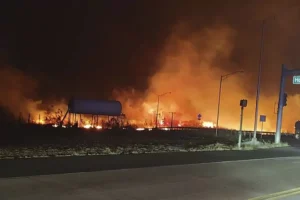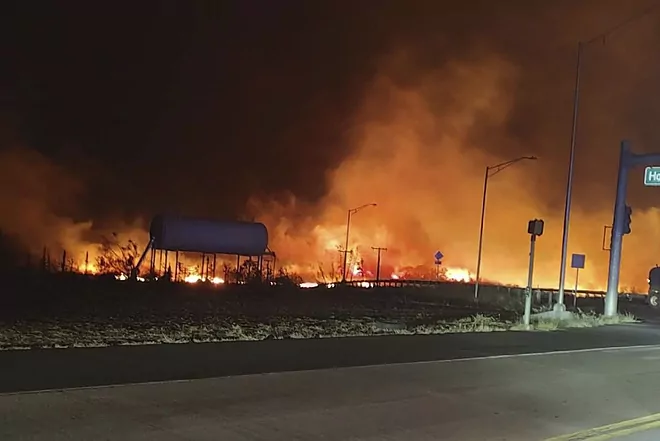
Introduction
In a tragic turn of events, the serene landscapes of Maui, Hawaii, have been engulfed by the destructive force of wildfires. The blazing inferno has not only consumed acres of land but has also claimed the lives of at least six individuals and ravaged countless homes. This disaster serves as a harsh reminder of the unpredictable and devastating power of nature.
1. The Ignition and Rapid Spread
The ignition of the wildfires is believed to have been triggered by a combination of factors, including dry weather conditions, strong winds, and human activity. The initial spark, whether caused by a discarded cigarette, a faulty power line, or even intentional arson, found its foothold in the dry and parched vegetation of Maui. Once ignited, the flames found ample fuel to fan their growth, spreading rapidly due to the prevailing drought conditions and the abundance of dry vegetation.
2. Evacuation Efforts and Humanitarian Aid
Local authorities sprang into action as soon as news of the wildfire broke. Evacuation orders were issued to ensure the safety of residents in the affected areas. Schools, community centers, and emergency shelters were swiftly set up to provide refuge to those displaced by the fires. Humanitarian organizations and community volunteers joined hands to offer assistance to the displaced families, providing them with essentials such as food, clothing, and emotional support during this tumultuous time.
3. Brave Firefighters Battling the Inferno
The heroes of this crisis are undoubtedly the brave firefighters of Maui, supported by firefighting teams from neighboring islands and even the mainland. These courageous individuals put their lives on the line as they battle the relentless blaze. Armed with state-of-the-art equipment, they employ a combination of techniques, from backburning to water bombing, to contain and extinguish the flames. Their relentless efforts not only protect property and infrastructure but also save lives.
4. Impact on Wildlife and Biodiversity
The destructive path of the wildfires has not spared the island’s wildlife and biodiversity. The unique ecosystems that thrive in the lush landscapes of Maui have been disrupted. Many native species, both flora and fauna, have faced displacement, loss of habitat, and even death. Conservationists and biologists are deeply concerned about the long-term ecological impact of this disaster, urging efforts to rehabilitate and restore the island’s delicate balance of life.
5. Community Resilience and Unity
In the face of adversity, stories of remarkable resilience and unity have emerged from the heart of Maui’s communities. Neighbors and strangers alike have extended their hands to offer help to those in need. It’s a testament to the unbreakable spirit of the island’s residents. The disaster has also ignited a wave of volunteerism, with people from all walks of life coming together to support one another in their time of need.
6. Assessing the Aftermath
As the firefighting efforts gradually bring the flames under control, the daunting task of assessing the aftermath comes into focus. Authorities will evaluate the extent of damage inflicted upon homes, infrastructure, and natural resources. This assessment will play a pivotal role in charting the course for the recovery and rebuilding efforts that lie ahead.
7. Preventive Measures and Future Preparedness
In the wake of this devastating event, discussions surrounding preventive measures and future preparedness have gained momentum. Local governments and communities are likely to invest in fire-resistant infrastructure, improved firefighting capabilities, and public awareness campaigns aimed at educating residents about fire safety and prevention. Lessons from this disaster will guide actions taken to prevent similar tragedies in the future.
8. Climate Change and Wildfire Frequency
The increasing frequency and intensity of wildfires worldwide have prompted important conversations about climate change. Scientists emphasize that rising global temperatures and shifting weather patterns contribute to the conditions conducive to wildfire outbreaks. This tragedy underscores the urgent need to address climate change and adopt sustainable practices to mitigate its impact.
9. Learning from Tragedy: Respecting Nature
The devastating Maui wildfires serve as a poignant reminder of the consequences of human actions and negligence. In a world where urbanization often encroaches upon natural habitats, events like these highlight the imperative of respecting and preserving nature. Sustainable land management, responsible behavior, and policies that prioritize both human and environmental safety are essential to preventing similar catastrophes.
10. Conclusion
The Hawaii wildfires that ravaged Maui have left behind a landscape forever changed. Lives have been lost, homes destroyed, and ecosystems disrupted. Yet, amidst the destruction, the strength of the human spirit shines through. From the bravery of firefighters to the resilience of communities, this disaster has brought out the best in people. As recovery efforts continue, it is incumbent upon us to remember the lessons learned from this tragedy, to honor and protect the natural world, and to work collectively towards a safer, more sustainable future.
FAQs
- Q: How did the wildfires start in Maui? A: The wildfires in Maui are believed to have been ignited by a combination of dry weather, strong winds, and human activity.
- Q: How many lives were lost due to the wildfires? A: At least six individuals tragically lost their lives as a result of the Maui wildfires.
- Q: What impact did the wildfires have on wildlife? A: The wildfires had a significant impact on local wildlife, displacing species and damaging their habitats.
- Q: How are communities and authorities responding to the disaster? A: Communities and authorities have come together to provide evacuation assistance, humanitarian aid, and firefighting efforts.
- Q: What lessons can we learn from this tragedy? A: The Maui wildfires underscore the importance of respecting nature, adopting preventive measures, and being prepared for future disasters.

